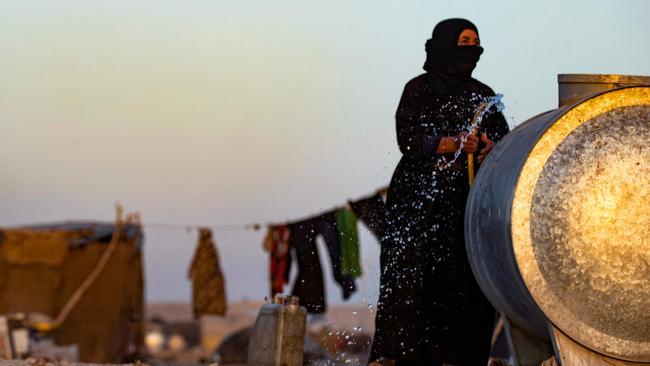Islamic State brides will be detained on arrival from Syria
Women brought back from Islamic State camps will likely be detained immediately upon arrival in Australia.

Women brought back from Islamic State detention camps in Syria will likely be detained immediately upon arrival in Australia.
The Australian understands the 16 women expect to either be charged or face court for the purposes of making a terrorism control order.
Either way, they will likely be immediately detained in a prison, detention centre or holding cell pending court appearances.
Police, who could charge up to nine of the women with offences including entering the proscribed city of Raqqa, will then either apply for them to be held in custody or release them on bail into the community.
Those who are not charged will face the Supreme Court in NSW or Victoria while the Australian Federal Police seeks terrorism control orders.
Those appearances could be made via video-link.
This can be done speedily as the women have all agreed to voluntarily submit to such an order, which can include wearing an ankle monitoring device, and allowing federal and state police and ASIO to monitor their social media use, internet use, communications, movements and associates.
They would then be released into the community. Extended family and kinship groups would care for the children in the short term, while in rare cases the children may go into state care, at least temporarily.
The national security committee of cabinet convened in Canberra on Tuesday to discuss final details of a planned repatriation of 16 women and 42 children from the al-Roj detention camp in northeastern Syria.
Home Affairs Minister Clare O’Neil did not comment after the meeting.
The most vulnerable of the families – those with very young children, whose mothers were forced or tricked into entering Syria by their parents or husbands – will be prioritised, following final risk assessments carried out by ASIO.
AFP Commissioner Reece Kershaw said police “may or may not have criminal charges against some individuals.’’
“That is a process we will go through,” he told 2GB radio.
He said the AFP’s main focus would be “protecting Australians from any harm’’ but police also wanted to see justice served.
“If you commit any crimes against our federal criminal code or other codes, you should be held to account,’’ he said.
The women and their children have spent the past 3½ years detained in camps in northeast Syria following the fall of Islamic State in March 2019.
Peter Dutton appeared to slightly soften his position towards the women, whom he previously said could carry out mass casualty attacks and that some were “as hardcore as some of the male terrorists’’ who had travelled to Syria and Iraq.
The Opposition Leader expressed deep concern at funding arrangements for the surveillance required when the women were released into the community, and about a lack of transparency from government as he sought briefings from Mr Kershaw and ASIO Director-General Mike Burgess.
“We need to know, for example, whether all of these individuals are Australian citizens, because sometimes, particularly where an Australian citizen male has gone to fight for ISIL and they’ve been killed in that theatre of war, those orphaned children will end up with other parents,’’ he said.
“I just need some information. I think the Australian public would demand information about the individual cases.’’
Mr Dutton said it would cost millions of dollars to monitor one single high-risk individual, and he did not believe the government had adequately funded ASIO and the AFP to handle the increased workload.
He said the priority had to be keeping the broader Australian community safe but he also said “we have an obligation to Australian citizens – I accept that.’’
His comments were more nuanced than those of home affairs spokeswoman Karen Andrews, who said earlier this week she saw no benefit in bringing the families home and “If I was still minister for home affairs, those people would not be returning to Australia.’’
Other Coalition frontbenchers including Angus Taylor, Bridget McKenzie and Dan Tehan have made similar comments to Mr Dutton’s, expressing concern about the process, cost and transparency of the repatriation process.
Mr Dutton agreed with Ms Andrews’ comments about threats posed by some of the boys who had been exposed to Islamic State ideology, saying “it’s a reflection of the reality of what we’re dealing with. We’re dealing with impressionable young minds who have been mixing in camps with people who have been committing terrorist offences … They’re tragic circumstances and I hate the fact these children have been put into harm’s way, but we have to make decisions that will keep the Australian public safe.’’
Of the group of 42 children in the camp, The Australian is aware of 23 girls and 16 boys, while the gender of the other children is not known. Twenty-five of the children are eight years or younger. The youngest child in the camp is just two.
Education Minister Tanya Plibersek said there was “an ongoing discussion about the fate of these women’’ but it seemed like several of them were tricked or coerced into going to Syria, some of them as young teenagers.
“At the end of the day, we’ve got 40 Australian kids in one of the most difficult and dangerous places in the world. Anybody who took a child into a zone like this is really committing child abuse.
“It is a very, very dangerous place to take a child. And we’ve got Australian children growing up in difficult, traumatic circumstances,’’ she told the ABC.
NDIS Minister Bill Shorten said national security was the government’s No. 1 priority. He told Nine he had “no sympathy at all’’ for the male fighters who went to Syria, but he could see both points of view on the issue.
“I just want to reassure people it’s about national security first,” he said.






